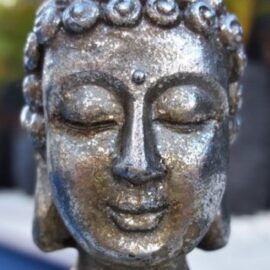

This article is an excerpt from the Shortform book guide to "Radical Acceptance" by Tara Brach. Shortform has the world's best summaries and analyses of books you should be reading.
Like this article? Sign up for a free trial here .
Do you ever struggle with feelings of unworthiness? Do you feel like you’ll never be “good enough”? Where do these painful feelings stem from?
In today’s society, almost everybody struggles with feeing unworthy. This feeling stems from many sources and can lead to self-destructive behaviors and coping mechanisms. However, by trying to hide the pain, we’re often making it worse.
Keep reading to learn about the roots and dangers of feeling unworthy.
Feeling Trapped by Unworthiness
Many people—perhaps even most people—struggle with feeling unworthy. They never feel as if they’re good enough, or smart enough, or successful enough, or whatever the focus of their insecurity is. In their attempts to become “better,” people constantly observe and judge themselves. They are always on the lookout for imperfections in themselves and, when they inevitably find some, it just drives them deeper into their sense of inadequacy.
These feelings drive people to all kinds of self-destructive behavior, most notably addiction in all its various forms. Whether the addiction is to drugs, sex, work—an addiction that is, unfortunately, applauded by Western culture—or something else, it often stems from an attempt to escape the feelings of worthlessness.
They also create feelings of isolation. People who don’t think that they’re good enough will assume that others think the same. They’ll find it hard to trust people who offer them love, friendship, or even simple encouragement.
The tragic irony is that people are always trying to go somewhere else, do something else, be someone else; but we all reach the same inescapable end. Where do we think we’re going?
The Source of Unworthiness
To illustrate how we come to have these unworthy feelings, Tara Brach, author of Radical Acceptance, shares an anecdote about her time at an ashram—a small religious and spiritual community. She struggled with feelings of inadequacy and self-loathing, and hoped that she could alleviate them through spiritual growth.
It worked to some extent. After a lengthy session of meditation and yoga, she would feel whole and at peace. However, as the day went on, feelings of self-doubt and judgement would creep in. She wanted others to admire her spirituality, and felt guilty for having those desires. At the same time, she judged some other members of her ashram for what she saw as their deficient spirituality, and felt guilty for those thoughts.
She eventually came to realize that, at the most basic level, she was still trying to do the same thing as always: She was trying to find peace and self-acceptance by changing or improving herself. That was why, no matter how deeply she meditated or how proficient she became at yoga, those feelings were doomed to always come back.
Consider the foundational myth of much of Western culture: Adam and Eve in the Garden of Eden. Most of us have heard it so many times that it’s become banal, but take a moment to really think about the message of it. The story of Eden teaches us humans are inherently bad, and we need to cleanse ourselves of sin before we’re worthy of happiness. Moreover, the way we cleanse ourselves is supposed to be through strict control: Control of our thoughts, our emotions, our natural urges, other people, and even the world around us.
Childhood Unworthiness
Western culture breeds and nourishes unhealthy, self-loathing thoughts. From childhood we’re constantly set in competition against each other, forced to prove endlessly that we’re smart enough, skilled enough, “cool” enough to be worthy of attention and praise. Every human connection—with family, friends, or teachers—has to be earned, and there’s always someone watching to see if we’re living up to expectations.
There’s a short anecdote about a family in a restaurant: a mother and father, and their five-year-old daughter. When the waitress comes to take orders, the daughter asks for a hot dog. The father immediately interrupts and says that she’ll have the meatloaf instead. The waitress, completely ignoring the interruption, asks the girl what she’d like on her hot dog. The parents are stunned, but the girl comments with amazement, “She thinks I’m real.”
This story gets to the heart of a lot of the insecurities people grow up with. Many of them stem from a culture that treats children as if they’re not real people, with their own thoughts and feelings. Instead, imperfect parents—carrying on lessons from their own imperfect parents—see their children through the lenses of their own desires and fears. What if the child doesn’t get into a good college? What if she acts out and reflects badly on her parents? They try to drive the child’s life the way they wish they’d driven their own lives, never thinking to ask the child what he or she wants.
In abusive homes this is taken to the extreme, where children are told that they’re in the way, that they’re annoying, that they’re worthless drains on the parents’ time and energy. However, even in healthier situations, children are often taught to be quiet and obedient, and to parrot what their parents think or want to hear.
In short, Western families—often unintentionally—continue the story of the Garden of Eden. Each new generation is brought up thinking that they’re inherently, fundamentally flawed, and that they have to fix those flaws in order to get back into the Garden.
Unhealthy Strategies to Cope With Unworthiness
Naturally, people seek out ways to cope with or cover up the feelings of unworthiness or inadequacy, like Adam and Eve trying to hide their nakedness from God. Over time, each of us comes up with our own personal mix of coping mechanisms to hide our imperfections and make up for what we believe to be wrong with us. Here are a few examples.
- We constantly undertake self-improvement projects. Whether it’s trying the newest weight-loss program, taking workshops, or angling for a promotion at work, we’re always trying to improve in some way. Of course, there’s nothing wrong with that in itself, but all too often this quest for self-improvement is driven by the anxiety that we’re not good enough, whatever that means to us.
- We avoid risks. Everyone knows that failing—at a work project, a new hobby, or a hoped-for relationship—is painful and embarrassing. We want to be instantly good at what we do and to succeed at everything. It’s a natural feeling, but taken to the extreme that fear holds us back from expressing ourselves, from seeking out responsibility or leadership roles, or even just from trying new things.
- We hide from our own experience. We have a running narrative about our lives that we use to separate ourselves from whatever raw emotions we may be feeling in the moment. The narrative is bound to have certain running themes: what we have done and still need to do, how others see us, how others have helped us or let us down. Constantly thinking about the past and worrying about the future gives us a false sense of control, while robbing us of the experience of actually living.
- We stay busy. Burying ourselves in work is a socially acceptable way to avoid pain. “I’m keeping busy” is an all-too-common response when we ask how someone in mourning is doing. If we ever slow down, we risk having our pain and our feelings of inadequacy and worthlessness catch up. As soon as there’s any break in the work we immediately turn to our phones, our televisions, food, music, anything to keep our own psyche at bay for a while longer.
- We criticize ourselves. We search for—and find—every flaw we have and every mistake we make. It gives us a false sense that we’re controlling our urges, hiding our weaknesses, and perhaps improving ourselves. However, the endless self-reproach does more harm than good.
- We criticize others. By blaming and judging others, we remove some of the pressure from ourselves. Instead of making ourselves the enemy, the enemy could be a parent who didn’t respect us, or a political group who takes away our rights. There are, of course, genuine threats in the world that need to be dealt with accordingly. However, if we simply lash out and attack these external evils, it causes harm in much the same way as attacking ourselves; it strengthens the harmful thought patterns and the damaging responses to them.
Most of these coping mechanisms are rooted in the assumption that there’s something fundamentally wrong with us. Every time we recognize and hide from our own sense of inadequacy, we’re strengthening the neural pathways that cause that feeling in the first place. Even the last one, which assumes that there’s something wrong with others instead of ourselves, perpetuates the harmful pattern. In short, by trying to avoid the pain, we’re only making it worse.

———End of Preview———
Like what you just read? Read the rest of the world's best book summary and analysis of Tara Brach's "Radical Acceptance" at Shortform .
Here's what you'll find in our full Radical Acceptance summary :
- How to live your life fully experiencing everything
- Why you need to let go of judging yourself or your experiences
- How you can acknowledge and welcome any experience






